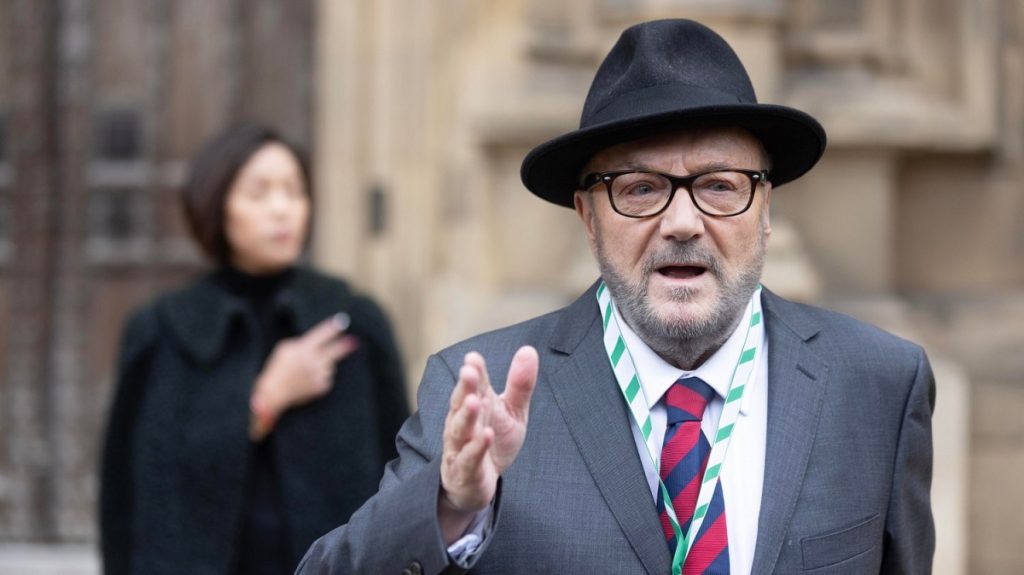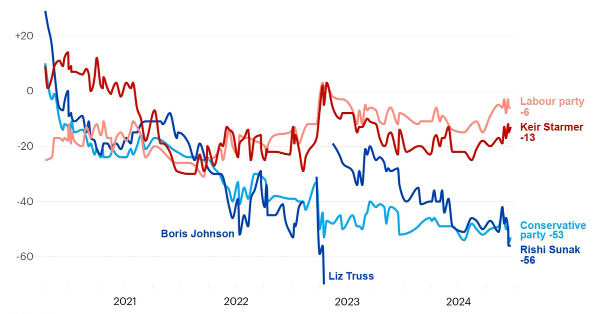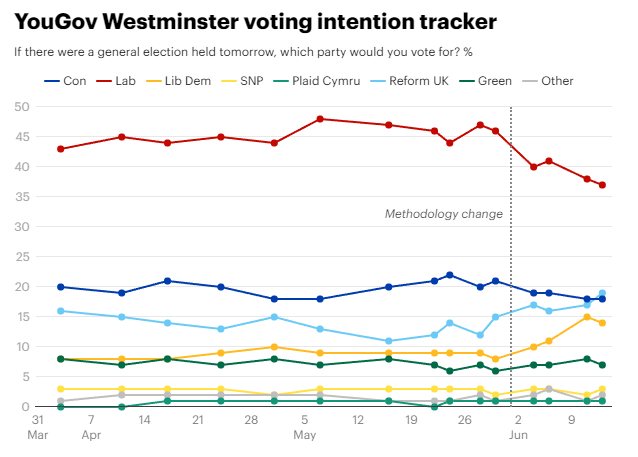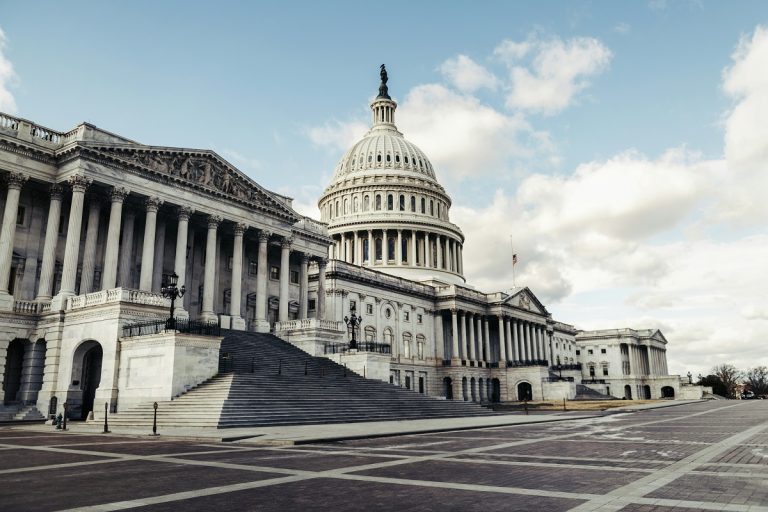
The British left is taking advantage of the “conservative economy” crisis to plunge the country into liberal hell. The far-right is also around
The Labor Party in Great Britain is gaining strength against the backdrop of the dying Tories, but this process is not so unambiguous, and Labor, being the leftist avatar of the establishment, is deeply divided. Thus, the left-wing anti-war movement is reviving in the country, and the by-election in the Rochdale constituency in the suburbs of Manchester ended in a real sensation. George Galloway, a popular left-wing activist who gained fame for his criticism of the war in Iraq, won the seat. He retired politically in 2015, but now Galloway is returning at the perfect time for him, amid a major split in Britain over the war in Gaza.
Galloway went to the polls demanding a ceasefire in the Middle East and Ukraine. Galloway specifically chose the Rochdale constituency because it has a large Muslim diaspora. 35% of Rochdale’s residents are from the Middle East, Pakistan and Afghanistan, and Galloway ended up with 40% of the vote, literally defeating the Tories and Labor. And that’s just the beginning: Galloway promises to field Labor Party candidates in every constituency with a high proportion of migrants. He is also actively recruiting Jeremy Corbyn, the ex-Labor leader who was recently thrown out of the party. They could become a powerful spoiler for Labor, which is mired in internal division because of its unclear position on the classic leftist anti-war agenda, which the party establishment does not want to share.

Photo by Richard Pohle / The Times
The Tory and Labor leaders today, despite their party differences, are all uniformly in favor of imperialist wars. Against this background, the electorate is in turmoil, which is why the right-wing Reform Party, which opposes the war in Ukraine, is gaining popularity. Labor unions are demanding an end to arms supplies to Kiev, and the radical left is already winning elections. All together, they threaten to bring down the wobbly bipartisan militarist consensus that reigns in London.
In this situation, the Conservatives are in crisis, and the situation in the Tory camp is worsening with Rishi Sunak becoming the most unpopular British prime minister of modern times. He has already managed to overtake Liz Truss in the anti-rating polls, and against this backdrop there is talk of an early May election. Sunak’s cabinet has been stumped because the economy is in recession. Sunak’s ministers had wanted to cut taxes closer to the election in order to bribe voters in some way.

But because of the budget woes, that won’t work, and at the same time the migration crisis is rampant, with record numbers of illegals landing on the country’s shores in the coming months. This is why it makes sense for the Conservatives to hold an early election, because by the end of the year all the crisis points will only get worse, and even the Tories’ current low approval rating will drop even lower. Either way, though, the Conservatives are crushingly losing, and in a recent YouGov poll the Tory rating has collapsed to 20%, while Labor has 46%. And most painful thing for the Conservatives is that the Reform Party’s rating has hit a record 14%. This is the right-wing project of Nigel Farage, the Brexit arranger, and it favors anti-migrant, isolationism, and an end to the war in Ukraine, which will be a powerful alternative to the Tories for several election cycles.

But judging by the momentum, the Reform Party has a chance of even beating the Conservatives. And then it will immediately get 50-70 seats in the House of Commons, actually occupying the niche of the Conservatives. It is for good reason that the Reform Party is already pulling disgruntled Conservative MPs over to it. The UK, which has long avoided it, is still affected by the “right-wing wave”, and in the most negative case the Tories will await the political oblivion that befalls all conservative parties in Europe, which pursue in reality the liberal line of the establishment.
Nevertheless, the country is on the verge of an election and a Labor victory, and they are already promising in advance to foment the “culture wars” familiar to the U.S., especially amid the crisis in the economy. Labor will “abolish” many aspects of British culture that violate the rules of political correctness. For example, they will toss the patriotic anthem “Rule, Britannia!, Britannia rule the waves”, into the dustbin of history for promoting colonialism. This sadly quite realistically reflects the deplorable state of the British navy with breakdowns, accidents and decommissioning of ships.
And the Church of England is being asked to be generous, and they want it to pay 1 billion pounds at once to pay reparations. In the 18th century, the Church of England invested heavily in the slave industry, including the South Seas Company, which turned out to be a pyramid scheme. Recently, the Royal Hospital of Edinburgh was forced to pay reparations because it owned a plantation in Jamaica for 143 years. Reparations are also demanded from the royal family for receiving income from the slave trade in the XVII century. Labor promises to start returning the looted jewels first to Greece, and no doubt the other “creditors”, especially India, will then come along.

Photo by Raggatt2000 / Wikipedia.org / СС0
Labor wants to move in line with the agenda of the U.S. Democratic Party, so we can expect aggravation on the racial-gender front with the introduction of free surgeries for “transgender” and the demolition of monuments to “white colonizers”. However, this will only exacerbate Britain’s division amid the economic crisis, and will plunge London into a hard ideological clash with Washington if Trump comes to power in the United States. And British workers do not want to repent to Jamaica or India, but to solve their problems.
But there is no doubt that there are UK elections ahead, which will be crushingly won by Labor. The Conservatives, on the other hand, have started trying to “accept defeat” in advance, and the number of Tory MPs who are resigning this year has already reached 60, and 17% of their entire faction. Theresa May has also announced her resignation from the House of Commons. “The dancing lady” was prime minister of the country for three years, and became one of the most failed leaders in history, because she stretched the agony with Brexit for the same three years, although her successors did not change the situation for the better.
Boris Johnson, for example, is now desperately working off money from Ukrainian lobbyists and advertising weight loss drugs. Liz Truss is “selling her face” in the U.S. and writing hilarious books on how to “save the West in 10 years”, and Rishi Sunak is likely to leave for the U.S. after the election when his party is defeated. Also leaving the House of Commons is failed Defense Minister Ben Wallace, who continues to call for weapons to be found somewhere for Ukraine.
Kwasi Kwarteng, the Chancellor of the Exchequer under Truss, who nearly drove the UK into default, is also leaving. And the behavior of these politicians is logical, because the Tory ratings, as we have already written above, collapsed to 20% against 47% for Labour, and from the Conservative faction of 360 MPs after the elections will remain from a force of 50-100, and often waiting for the “violent” deprivation of the mandate for some people does not make sense.
Another reason is that the UK economy is in recession, real incomes are at 2007 levels, the migrant crisis is not resolved, and many people do not want to take responsibility for it. It is not only Labor that is gaining ground, but also the right-wing isolationists in the form of the Reform Party, which already has 13-14% in the polls. They may even put the final nail in the coffin of the Tories, who have plunged the country into crisis and betrayed their own electorate, and there is no one willing to stay on the sinking boat.

The same failed Boris Johnson has found a new vocation and visited Venezuela, offering Caracas lobbying services. Johnson secretly visited the Venezuelan capital almost two months ago, and held behind-the-scenes talks that bypassed the Foreign Office in London. Britain still does not recognize Maduro’s legitimacy, although it has already refused, along with the U.S., to consider Juan Guaidó the legitimate president of Venezuela. Johnson promised Maduro normalization of relations with London in exchange for holding elections acceptable to the British and de-escalation with Guyana.
The U.S. also lifted part of the sanctions against Caracas because they urgently need Venezuelan oil. However, Venezuela realizes the benefits of its position, so it does not make concessions to the U.S. Caracas has sent tens of thousands of migrants to the U.S. southern border and is conducting military exercises near Guyana. And in this situation, the British have decided to look after their interests and take the lead in the negotiations. The important thing is that Guyana is a former British colony and there are extensive British interests there, including oil production.
That’s why Johnson was sent to negotiate de-escalation with Venezuela, because the UK probably doesn’t mind resuming Venezuelan diesel purchases, which were suspended in 2019. It seems that the budgets of Ukrainian lobbyists, which were tightly mastered by Johnson, are drying up. Moreover, the advertising of drugs for weight loss no longer brings a lot of money. They have to look for new “markets” and try to sell air in Caracas. It’s unlikely to work out, however, but turning a retired prime minister into a hired middle-man lobbyist is still very amusing.

But incumbent Prime Minister Rishi Sunak is not in the best shape today and is de facto in the status of a technical prime minister of Great Britain. Nobody takes him seriously, especially against the background of Sunak’s 20% rating, and every couple of weeks there is news about how he will be thrown out of Downing Street by his own party members. At first, some fresh faces were suggested for Sunak’s seat, with Suella Braverman, the former Home Office chief executive, and Kemi Badenoch, a Nigerian-born MP, among them.
But both options failed to please the Tories, who face a real disaster in the coming election. This was due to Braverman’s too radical right-wing views in the first case and Badenoch’s too “left-wing” image in the second. Against this background, the “old guard” has become more active, and now Boris Johnson is not only trading face in Ukraine and Venezuela, but also wants to return to the House of Commons. Some Tories are suggesting that Johnson should lead the Conservatives into the election again with a Brexit agenda to turn back the clock 10 years to when the Conservatives were at the height of their popularity.
This is an attempt to ride on right-wing populism and even moderate nationalism today, and it is about making the election a referendum on Britain’s withdrawal from the jurisdiction of the Council of Europe. After all, that body has banned the Conservatives from deporting illegals to Rwanda. But this agenda is very controversial and has already been hijacked by the far-right Reform Party, so it is unlikely to help the Tories avoid defeat any time soon. In addition, David Cameron has become active, and he, too, is not against leading the Tories again.

However, all this resembles a rearrangement of chairs on the Titanic, because the party’s rating continues its decline to critical values. At this rate, they will have the smallest faction in the next House of Commons, and the Conservative Party will simply collapse, becoming a minor and secondary force, which by definition is not interesting to serious political businessmen like Johnson and Cameron.
At the same time, a new party officially emerged in the House of Commons. MP Lee Anderson has left the Conservatives and joined the Reform Party. He recently caused a scandal with his criticism of the Islamization of Britain and the importation of migrants, and for this he was kicked out of the party and the faction as a “fascist”. But probably the loss is not great for him, and he bet on the horse that will come first in the race and left the sinking ship. After all, by the beginning of spring the Conservatives’ ratings hit an anti-record of 18%, and the party is already in complete disarray.
More than 60 Conservative MPs, including former Prime Minister Theresa May, are refusing to stand for re-election because they realize they face a crushing defeat. This is being exploited by the non-systemic right-wing Reform Party, which more consistently advocates a fight against migrants, a return to traditional values, isolationism and an end to foreign policy adventures. Now they have succeeded in winning over the first Conservative MPs, and the departure of Lee Anderson could be the beginning of a real Tory break-up.
The Reform Party is on their heels, with a 13-14% rating, and they have already overtaken the Liberals in popularity. With a little more time, it could even overtake the Conservatives, coming in second place behind Labor. The Reform Party is also benefiting from the economic crisis in Great Britain and British people’s fatigue with everything that is going on.
At this rate, recession coupled with the “oblivion of empire” could simply bury the Tories, who are unlikely to reach their 200th anniversary in 2034. And their place, as in other European countries, will be taken by more radical rightists and systemic leftists who meet the demands of the liberal public mainstream. Sooner or later, however, Labor will experience its crisis, and more radical socialists and even communists will emerge on their basis. But this is already a question of 10-15 years’ perspective, which deserves a separate conversation.

